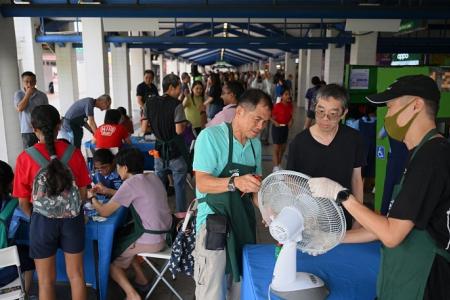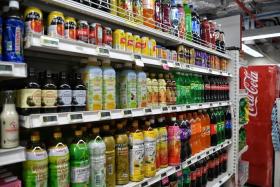New repair clinic teaches people to fix household items
A longstanding repair clinic where people can learn to fix their damaged household items will be located at a busy transport hub for the first time, when it begins operations on Oct 27 at Tampines Bus Interchange.
The tie-up between transport operator SBS Transit and Repair Kopitiam – a 10-year-old community-driven repair meet-up project – encourages people to repair items that are spoilt or not working well, instead of throwing them away.
Speaking to the media on Oct 26 at SBS Transit’s inaugural public sustainability event, the company’s group chief executive Jeffrey Sim said it is happy to host Repair Kopitiam as “we need to ensure sustainability is at the forefront of all that we do”.
“With high footfall and just a short distance from Tampines MRT station, the interchange is a convenient location where people can come and learn repair skills for free, which can lead to a change towards sustainable living,” he added.
Launched in 2014 by social enterprise Sustainable Living Lab, Repair Kopitiam has around 200 to 300 active volunteers who teach members of the public to repair electrical, fabric and mechanical items.
It was inspired by the Repair Cafe movement that started in 2009 in the Netherlands, where people gathered to repair items together.
The clinic at Tampines Bus Interchange is Repair Kopitiam’s 11th location in Singapore and the second in Tampines.
Clinics are held every last Sunday of the month, from 10am to 4pm, at venues across the island, including in Ang Mo Kio, Choa Chu Kang and Jurong East.
Bookings have closed for Oct 27 sessions. In general, at least six locations will each have between 20 and 25 slots.
If the clinic in Tampines is successful, Mr Sim said SBS Transit hopes to work with Repair Kopitiam to roll out more clinics at other transport hubs it operates around Singapore.
Mr Sim said steps were taken to ensure the clinic’s operation will not compromise the safety and security of commuters.
“We have to ensure sharp objects and tools are not left in the open... The clinic is also located in a corner and not blocking the path of commuters,” he said.
Mr Wong Tuan Wah, a 67-year-old volunteer at Repair Kopitiam, said 25 to 30 per cent of items brought in for fixing are fans. Other common items include kitchen appliances such as rice cookers, irons and blenders.
“More than 90 per cent of fans brought in can be fixed. We try to teach people as much as we can and hopefully they are confident to do their own minor repairs in future,” he said.
Mr Wong, who has been a volunteer for over two years, added that Repair Kopitiam is a “win-win project” where household items get a new lease of life and people can learn basic repair skills at the same time.
Saturday’s event was attended by Senior Minister of State for Sustainability and the Environment Amy Khor, who visited various booths showcasing sustainable practices that can be adopted at home.
These included growing plants in recycled plastic bottles and making coasters out of recycled fabrics.
A project by Secondary 3 students from Ngee Ann Secondary School involved making coin pouches out of kombucha scoby, by dehydrating it and adding beeswax.
Kombucha is a fermented drink made with tea, sugar, bacteria and yeast. Scoby is a symbiotic culture of bacteria and yeast used in the production of kombucha.
Get The New Paper on your phone with the free TNP app. Download from the Apple App Store or Google Play Store now


